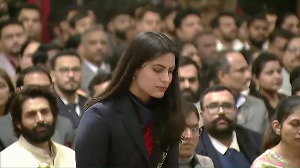Her experience has triggered off a civil war between Pakistan and Baloch tribes, caused economic damage to her employer, sparked tensions with neighbouring countries, and had people call for her death.
But Shazia Khalid is yet to find out who raped her last January.
Speaking at the Women's Media Center in New York, Khalid, who was a general practitioner at the Pakistan Petroleum Limited's Sui gas plant in remote Balochistan, said she was victimised by her own employer, the government, and society at large. And instead of treating her and help her get justice, her employer tried to hush things up, drugging Khalid and carting her off to a psychiatric ward in Karachi.
Meanwhile, the government put together a secret tribunal, then told her that for her own safety, she'd better leave the country till they captured the culprit and a verdict was reached.
The tribunal stood by her version but implicated no one. And Khalid was spirited out to Britain.
Khalid tried to commit suicide a few times but was stopped by her husband, Khalid Aman, who stood by her even after his own grandfather said his wife ought to be killed because she had brought the family dishonor.
Even the Baloch tribes took up her cause following allegations that an outsider, to boot an officer in the national army they so detest, was the rapist.
They began firing shells and rockets at the PPL plant, prompting a military response from the government. According to the British newspaper the Guardian, the government accused Iran and India of fomenting trouble in Balochistan.
At the event, Khalid said she feared the Hudood Ordinance that declared her an adulterer if she did not have four male witnesses to attest that she had indeed been raped; she appealed to President Pervez Musharraf to see her as a daughter and repeal the archaic religious laws instituted by President Zia-ul Haq, who ruled Pakistan between 1977 and 1988.
"I definitely want to return to Pakistan; it is my homeland," Khalid said, adding that she would return only if her rapist was caught and if an independent commission, including international lawyers, was set up to investigate her case.
Asked why she didn't take the matter to the court like Mukhtar Bibi, who was raped on the orders of a tribal council did, she responded: "They [the Pakistani government] were not sending Mukhtar out [of the country] because they thought that she could spoil the name of the country with her allegations; they sent me out because they had to get me out so that they could settle their own political issues."
She pointed out that in Mukthar's case, no violence followed while the attack on her sparked battles between the government and the Baloch tribes.
Her husband stepped in to say that he was told that because of them their country was breaking up.
Asked if she was not humiliating Pakistan by talking of her experiences in foreign fora, she replied, "The country was humiliated the day I was attacked in such a secure place" where nothing could happen without the official Defence Security Guards knowing of it.






 © 2025
© 2025